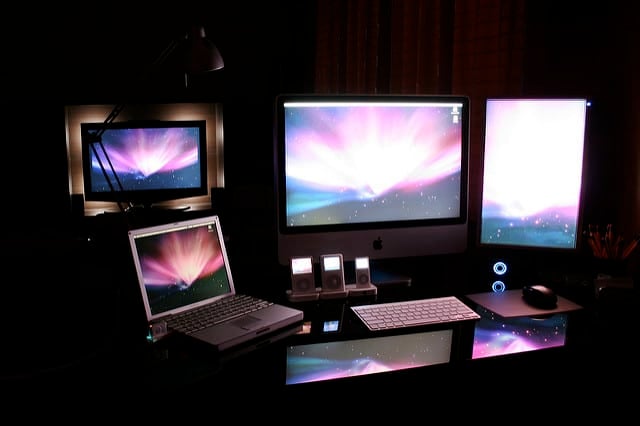What is the effect of all our time spent staring at glowing screens?
There is a burgeoning cottage industry of researchers exploring just such a question 1. You can tell because they write articles about the internet’s effect on us, which are usually read on the internet itself. How iRonic [sic]. But old-fashioned conversations yielded some anecdotal data of my own:
- I’ve gone entirely paperless. I read everything on a screen now. It saves a lot of paper.
- I was off social media for all of Lent. It’s amazing how much free time I suddenly had, and how much better I could concentrate.
- I used to check my smartphone last thing before bed and the first thing in the morning. It would just get my mind racing all the time.
- Facebook does not feed the good spirit in me. I now hate puppies, sped-up recipe videos, and politics.
- I reload my email at least eight times an hour, and when I feel the buzz of a new message, it’s like a shot of adrenaline – even if it’s a work email. [pause] Is that sad?
Thrills from work emails? Yes, sad.
* * *
I gather from some friends’ comments that feelings are mixed about our first few decades in the digital age. The economist John Maynard Keynes had predicted that technological advances in the 21sh century would make work a thing of the past, at least in the world’s developed economies.2 Yet, most youngish white-collar professionals indicate high anxiety and stress both at work and in their fragmented personal relationships. Which begs the question: are younger people — say, millennials and younger — weaker, whinier, and wimpier than previous generations?
The answer is a qualified no. I’d suggest that we millennials suffer not from too much work per se, but from how education, work, and play are mixed together in a strange cocktail of diffuse attention on a computer screen. Too many choices of how to spend our time, at work and at home, yields non-productive ‘work’ time and non-restful ‘play’ time. On any given day, I will have browser windows (or Apps) open for (in order): New York Times, Amazon, Gmail, Greek New Testament, The Onion, Facebook, First Things, Marilynne Robinson (Wikipedia), Jesuit Post, and Twitter. Sound familiar?
As Derek Thompson humorously puts it, “maybe knowing that there are 10 great TV shows you should watch, nine important books to read, eight bourgeois skills your child hasn’t mastered, seven ways you’re exercising wrong, six ways you haven’t sufficiently taken advantage of the city, etc., fosters a kind of metastasized paradox of choice, a perma-FOMO.3 Knowing exactly what we’re missing out makes us feel guilty or anxious about the limits of our time and our capacity to use it effectively.
To that, you throw in navel-gazing articles like this one to compound the distraction.
* * *
“The internet made me do it” doesn’t exonerate poor time management, but it does help to explain what seizes our collective attention. Consider: every minute of every day in the year 2015…
- 300 hours of new video were posted to Youtube. In the time it takes you to read this sentence, 30 more hours of shy kittens and cursing news anchors are now online for you to enjoy.
- Tinder users swiped 590,000 pictures every minute. (If you don’t know what Tinder is, don’t ask your kids. And don’t waste your time Googling it, either.)
- 77,000 hours of Netflix were watched.
- 4.1 million posts on Facebook were liked.
- 34 Jesuit Post readers just Googled “What is a Tinder?”
- in 2012, there were 100,000 new tweets tweeted each minute. In 2014, it climbed to 277,000 per minute. In 2015, the average was 347,000 tweets per minute.
What will these figures look like in ten years? How does this affect our attention?
The rapid rate of increase of Internet usage is staggering. From 2013 to 2015, the global internet population increased 18.5%, yielding 3.2 billion people connected online. For good or ill, that connectivity has tremendous effects on how people around the world relate to one another, from globalized entertainment to dissemination of dangerous ideologies.
* * *
I suspect each age has its boogeymen: “Books will rot your brain.” “Radio will rot your brain.” “TV will rot your brain.” “Video games will rot your brain.” “The internet will rot your brain.” And many articles tsk-tsking the internet sound a little like Drunk Uncle from Saturday Night Live:
The internet is inexorably here, and ever evolving in size, scope, and platforms. But for those of us attuned to eternal questions of meaning, we do well to ask, “where is all this time online leading us?” And “what does the time spent in front of glowing screens replace in our lives?” Keynes predicted that 21st-century abundance would render our lives easier. Yet we find ourselves paralyzed by an onslaught of daily choices:
- What article(s) should I read online? It’s okay, I’ll save all the others to Pocket.
- What series should I binge watch on Netflix, HBOGo, or Hulu?
- What Slack channels do I need to check today for work?
- What letter drafts in Google docs need my immediate attention?
- Whose Tweets merit retweeting?
- Why does my boss keep interrupting my shy kitten videos with work emails?
In the face of considerable online time, many people simply want to unplug. Put down the iPhone, at least for a while, and return to simpler activities. It is easy to see correlation – if not causation – in the explosive interest in coloring books among adults. As Thu-Huong Ha writes over at Quartz,
In a very short time, coloring has proven surprisingly addictive for America’s stressed, anxious, and overworked. Therapeutic without being therapy, meditative without being meditation, creative without being creation, artsy without being art, the supposedly soothing activity has also become a big business—in 2015 alone, US sales of coloring books shot up from 1 to 12 million units.
For a generation fettered to screens for work and play, the monotony of coloring — on real paper, with real pencils — has an appeal to it that is more than just nostalgia. So, too, with younger people pickling, canning, brewing, knitting, and (yes even) getting involved in faith communities that prefer silence to slickness; interiority over internet.
* * *
How do you find life apart from screen time? Share your thoughts below; or better yet, go for a walk with an old friend.
–//–
Title Image, “All Systems Glow” by Flickr user Crouching Donkey, is available here.


